Related Research Articles

Yule is a winter festival historically observed by the Germanic peoples that was incorporated into Christmas during the Christianisation of the Germanic peoples. In present times adherents of some new religious movements celebrate Yule independently of the Christian festival. Scholars have connected the original celebrations of Yule to the Wild Hunt, the god Odin, and the heathen Anglo-Saxon Mōdraniht. The term Yule and cognates are still used in English and the Scandinavian languages as well as in Finnish and Estonian to describe Christmas and other festivals occurring during the winter holiday season. Furthermore, some present-day Christmas customs and traditions such as the Yule log, Yule goat, Yule boar, Yule singing, and others may have connections to older pagan Yule traditions.

Christmas Eve is the evening or entire day before Christmas Day, the festival commemorating the birth of Jesus. Christmas Day is observed around the world, and Christmas Eve is widely observed as a full or partial holiday in anticipation of Christmas Day. Together, both days are considered one of the most culturally significant celebrations in Christendom and Western society.

Saint Stephen's Day, also called the Feast of Saint Stephen, is a Christian saint's day to commemorate Saint Stephen, the first Christian martyr or protomartyr, celebrated on 26 December in Western Christianity and 27 December in Eastern Christianity. The Eastern Orthodox churches that adhere to the Julian calendar mark Saint Stephen's Day on 27 December according to that calendar, which places it on 9 January of the Gregorian calendar used in secular contexts. In Latin Christian denominations, Saint Stephen's Day marks the second day of Christmastide.
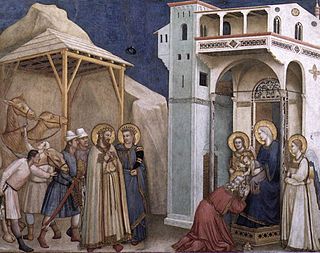
The Twelve Days of Christmas, also known as Twelvetide, is a festive Christian season celebrating the Nativity of Jesus. In the Western ecclesiastical traditions, "Christmas Day" is considered the "First Day of Christmas" and the Twelve Days are 25 December – 5 January, inclusive, with the last day being Twelfth Night. For many Christian denominations—for example, the Anglican Communion and Lutheran Church—the Twelve Days are identical to Christmastide, but for others, e.g., the Roman Catholic Church, Christmastide lasts longer than the Twelve Days of Christmas, running through the Feast of the Baptism of the Lord. Other methods of counting mark the twelve days from December 26 to January 6.
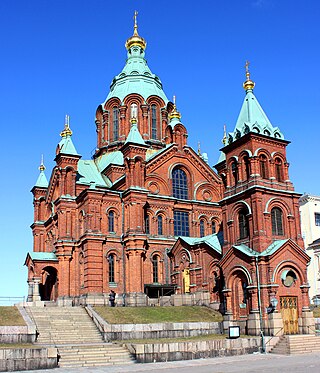
The culture of Finland combines indigenous heritage, as represented for example by the country's national languages Finnish and Swedish, and the sauna, with common Nordic and European cultural aspects. Because of its history and geographic location, Finland has been influenced by the adjacent areas, various Finnic and Baltic peoples as well as the former dominant powers of Sweden and Russia. Finnish culture is built upon the relatively ascetic environmental realities, traditional livelihoods, and heritage of egalitarianism and the traditionally widespread ideal of self-sufficiency.
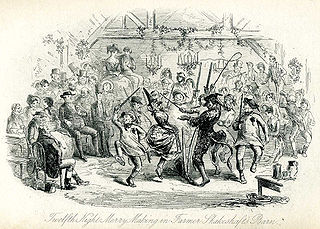
Twelfth Night is a Christian festival on the last night of the Twelve Days of Christmas, marking the coming of the Epiphany. Different traditions mark the date of Twelfth Night as either 5 January or 6 January, depending on whether the counting begins on Christmas Day or 26 December.

An Advent calendar, from the German word Adventskalender, is used to count the days of Advent in anticipation of Christmas. Since the date of the First Sunday of Advent varies, falling between November 27 and December 3 inclusive, many reusable Advent calendars made of paper or wood begin on December 1. Others start from the First Sunday of Advent.
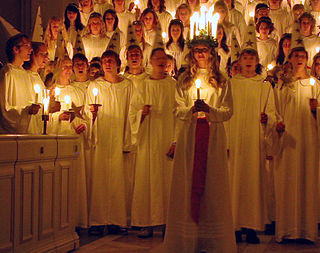
Saint Lucy's Day, also called the Feast of Saint Lucy, is a Christian feast day observed on 13 December. The observance commemorates Lucia of Syracuse, an early-fourth-century virgin martyr under the Diocletianic Persecution. According to legend, she brought food and aid to Christians hiding in the Roman catacombs, wearing a candle lit wreath on her head to light her way, leaving both hands free to carry as much food as possible. Because her name means "light" and her feast day had at one time coincided with the shortest day of the year prior to calendar reforms, it is now widely celebrated as a festival of light. Falling within the Advent season, Saint Lucy's Day is viewed as a precursor of Christmastide, pointing to the arrival of the Light of Christ in the calendar on December 25th, Christmas Day.

The observance of Christmas around the world varies by country. The day of Christmas, and in some cases the day before and the day after, are recognized by many national governments and cultures worldwide, including in areas where Christianity is a minority religion. In some non-Christian areas, periods of former colonial rule introduced the celebration ; in others, Christian minorities or foreign cultural influences have led populations to observe the holiday.

Saint Knut's Day, or the Feast of Saint Knut, is a traditional festival celebrated in Sweden and Finland on 13 January. It is not celebrated on this date in Denmark despite being named for the Danish prince Canute Lavard, and later also associated with his uncle, Canute the Saint, the patron saint of Denmark. Christmas trees are taken down on tjugondag jul, and the candies and cookies that decorated the tree are eaten. In Sweden, the feast held during this event is called a Knut's party.
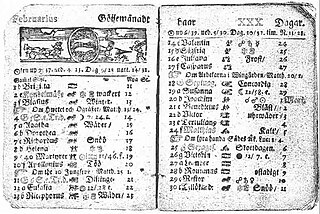
In Christianity, a name day is a tradition in many countries of Europe and the Americas, among other parts of Christendom. It consists of celebrating a day of the year that is associated with one's baptismal name, which is normatively that of a biblical character or other saint. Where they are popular, individuals celebrate both their name day and their birthday in a given year.

Jul or jol is the term used for the Christmas holiday season in Scandinavia and parts of Scotland. Originally, jul was the name of a month in the old Germanic calendar. The concept of jul as a period of time rather than a specific event prevailed in Scandinavia; in modern times, jul is a period of time stretching from the fourth Sunday before Christmas Eve, December 24, to (traditionally) mid-January at the date of Epiphany with the month of December and Christmas, and the week up to the New Year, as its highlight. The modern English yule and yuletide are cognates with this term.

The Yule goat is a Scandinavian and Northern European Yule and Christmas symbol and tradition. Its origin is from Germanic paganism and has existed in many variants during Scandinavian history. Modern representations of the Yule goat are typically made of straw.

Jul, the Danish Jule and Christmas, is celebrated throughout December starting either at the beginning of Advent or on 1 December with a variety of traditions. Christmas Eve, Juleaften, the main event of Jul, is celebrated on the evening of 24 December, the evening before the two Christmas holidays, 25 and 26 December. Celebrating on the eve before Christmas is also used for most other holidays in Denmark.
In Sweden, public holidays are established by acts of Parliament. The official holidays can be divided into Christian and non-Christian holidays. The Christian holidays are jul (Christmas), trettondedag jul (Epiphany), påsk (Easter), Kristi himmelsfärds dag, pingstdagen (Pentecost), and alla helgons dag. The non-Christian holidays are: nyårsdagen, första maj, Sveriges nationaldag, and midsommar (Midsummer). Midsummer is, however, officially also a Christian holiday to celebrate John the Baptist's birthday.

Christmas is celebrated throughout December and traditionally until St. Knut's Day on January 13. The main celebration and the exchange of gifts in many families takes place on Christmas Eve, December 24. The Feast of St. Lucy, a high point in the Swedish Christmas season, is celebrated during Advent, on December 13.

A Knut's party or Knut's dance is a tradition in Sweden on St. Knut's Day, which marks the end of the Christmas and holiday season, which includes Advent Sunday, Saint Lucy's Day, Christmas, New Year and Epiphany. It is also known as "Dancing out Christmas" or "Throw out the Tree".

Christmas in Finland begins, as is commonplace on public holidays in Finland, on Christmas Eve. Especially the evening of Christmas Eve has become the most important day of the Christmas period, and is nowadays a paid holiday in most workplaces. Unlike on other public holidays, public transportation stops almost completely on the afternoon of Christmas Eve in Finland. The Christmas period ends on Epiphany.
References
- ↑ Life in Finland Pikkujoulu – celebrating the start of the Christmas season in Finland Archived 2014-12-06 at the Wayback Machine (accessed 15 May 2014)
- ↑ ESN FINT Holidays and festivities in Finland, (accessed 15 May 2014)
- ↑ Embassy of Finland in Athens News, Show me the way to the next pikkujoulu, (accessed 15 May 2014)
- ↑ yle UUTISET Pikku Joulu high jinks keep police busy (accessed 15 May 2014)
- ↑ South Africans in Finland Christmas in Finland: Pikkujoulu,(accessed 15 May 2014).